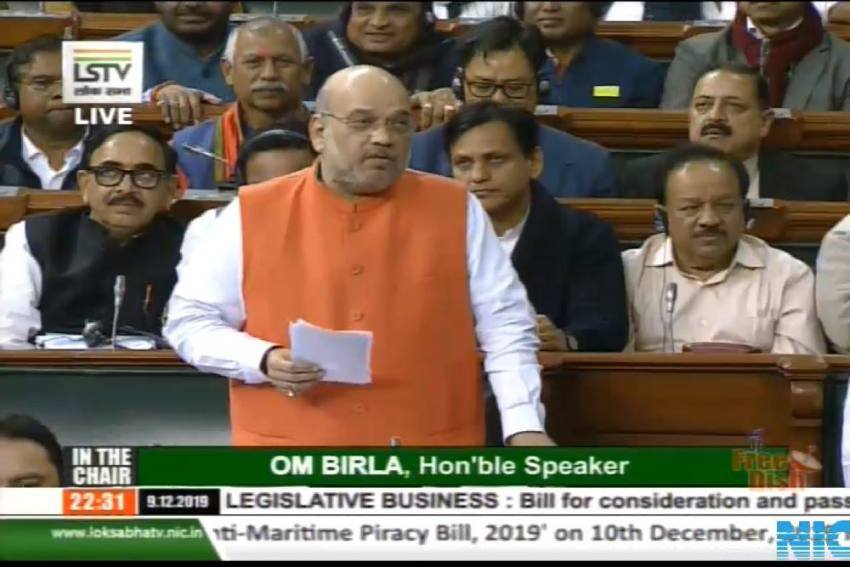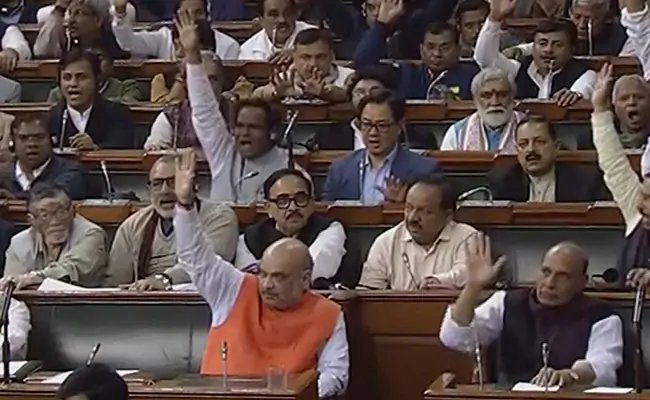A little past midnight on Monday, 9th December, the Lok Sabha passed the Citizenship Amendment Bill (CAB) with 311 members voting in favour and 80 voting against it.
The bill seeks to grant citizenship to refugees from the Hindu, Christian, Buddhist, Sikh, Jain and Zoroastrian communities fleeing religious persecution from Pakistan, Bangladesh and Afghanistan.

This means that the members of these communities who have come from Pakistan, Bangladesh and Afghanistan, till December 31, 2014 and are facing religious persecution there, will not be treated as illegal immigrants and will be given Indian citizenship.
Migrants who identify themselves with any group or community other than those mentioned above, from these 3 countries won’t be eligible for citizenship.
I extend my gratitude to PM @narendramodi for making the historic Citizenship Amendment Bill a reality, that will allow India to open its doors to minorities from Pakistan, Bangladesh and Afghanistan who are facing religious persecution.
— Amit Shah (@AmitShah) December 9, 2019
I thank everyone who supported this bill.
The bill also proposes to fast track the process of granting citizenship to the members of these communities, who have lived in India without documentation.
The proposed law also relaxes the provisions for ‘citizenship by naturalisation’. One of the requirements for citizenship by naturalisation under the current citizenship act is that the applicant must have resided in India in the last 12 months, and for 11 of the previous 14 years. The proposed law reduces these 11 years to just six years for people belonging to the same six communities and three countries mentioned above.
Delighted that the Lok Sabha has passed the Citizenship (Amendment) Bill, 2019 after a rich and extensive debate. I thank the various MPs and parties that supported the Bill. This Bill is in line with India’s centuries old ethos of assimilation and belief in humanitarian values.
— Narendra Modi (@narendramodi) December 9, 2019
The bill has exempted certain parts of the northeastern states from its purview. It reads:
Nothing in this section shall apply to tribal areas of Assam, Meghalaya, Mizoram or Tripura as included in the Sixth Schedule to the Constitution and the area covered under ‘The Inter Line’ notified under the Bengal Eastern Frontier Regulation, 1873.
Under the ‘Inter Line’ provision, Indians from other states require ‘Inner Line Permit’ to enter or pass through the states of Arunachal Pradesh, Mizoram and Nagaland.

While Home Minister, Amit Shah assured the nation that Indian Muslims need not fear the new law, Twitter is divided on the intention of the government.
Spent the day drafting a comprehensive writ petition against the #CitizenshipAmendmentBill.
— Saket Gokhale (@SaketGokhale) December 9, 2019
If it clears the RS, I’ll be approaching the SC next week (like some others I’m sure).
This fight will go down to the wire, Mr. Shah.
You don’t own this country.
Citizenship Amendment Bill is strategic response to India’s Neighbourhood theological & political culture. In 1947 Muslim population of Pak was 77%, minorities 23%. https://t.co/FZ4UVpdNxF. Now Muslims 97%, others 3%. 20% minorities have disappeared. CAB is for them, not for 97%
— S Gurumurthy (@sgurumurthy) December 9, 2019
The Citizenship Amendment Bill which seeks to grant citizenship in India on the basis of religion is not only unconstitutional but it goes against the very grain of our Republic. By seeking to divide the country on religious lines, its sponsors are the real “tukde-tukde” gang!
— Prashant Bhushan (@pbhushan1) December 10, 2019
“If the CAB passes in both houses of parliament, the United States government should consider sanctions against the Home Minister and other principal leadership” : USCIRF, the US body that recommended revocation of PM Modi’s (then CM) visa in 2005https://t.co/Bjh9f0jNNN
— Suhasini Haidar (@suhasinih) December 10, 2019
Why is India surprised by Modi’s #CitizenshipAmendmentBill? You don’t elect a majoritarian bigot to protect your secular constitution. It is part of the package and still more to come!
— Ashok Swain (@ashoswai) December 9, 2019
Okay, Even better.
— Vinod Khandade (@VinodKhandade) December 9, 2019
This is article 15.
The Citizenship Amendment Bill is exactly against this secular principle. Wake fucking Up, India.#IndiaRejectsCAB pic.twitter.com/6I10BCxKQR
The passage of the #CitizenshipAmendmentBill in Lok Sabha is a historic moment for us all. It will not only give relief to 6 persecuted minority communities from 3 neighbouring countries but will also pave the way for constitutional safeguards to the indigenous people of Assam.
— Sarbananda Sonowal (@sarbanandsonwal) December 10, 2019
The whole bill is not about Indian Muslims. #CitizenshipAmendmentBill https://t.co/Eg2lysR7dn
— Pradeep Bhandari(प्रदीप भंडारी) (@pradip103) December 10, 2019
I support the Citizenship Amendment Bill….. Minorities that are persecuted around the Indian sub continent, should have a place to turn to when they nowhere else to go…… https://t.co/2uVP8hxqzG
— Roopesh Ravindran (@Roopesh_80) December 10, 2019
The politics over the Citizenship Amendment Bill and the support it’s getting from non NDA parties reminds us that our political leaders cannot uphold our Constitution. Just like the opposition’s failure on Kashmir. Less said about the courts the better
— Nidhi Razdan (@Nidhi) December 5, 2019
Well played BJP..👏👏 This needs to done earlier.. India is for them who belongs to India not for outsiders as they are illegally staying here from so many years.. I completely support CAB Citizenship Amendment Bill.. #CitizenshipAmendmentBill🇮🇳🇮🇳 #IndiaWithCAB https://t.co/wSsBvPNs2P
— Ⓜ️🌠♑ℹ️K🅰️ 💲❕🆖♓ (@monikasingh1206) December 9, 2019
Modi is taking the next step in steering the world’s largest democracy from a secular country into a Hindu theocracy. India has one of the largest Muslim populations in the world and they are very afraid. https://t.co/PZErU99QC0 #CitizenshipAmendmentBill
— Shreeya Sinha (@ShreeyaSinha) December 9, 2019
The bill which now stands passed by the Lok Sabha will be tabled and debated in the Rajya Sabha on Wednesday, 11th December.

















